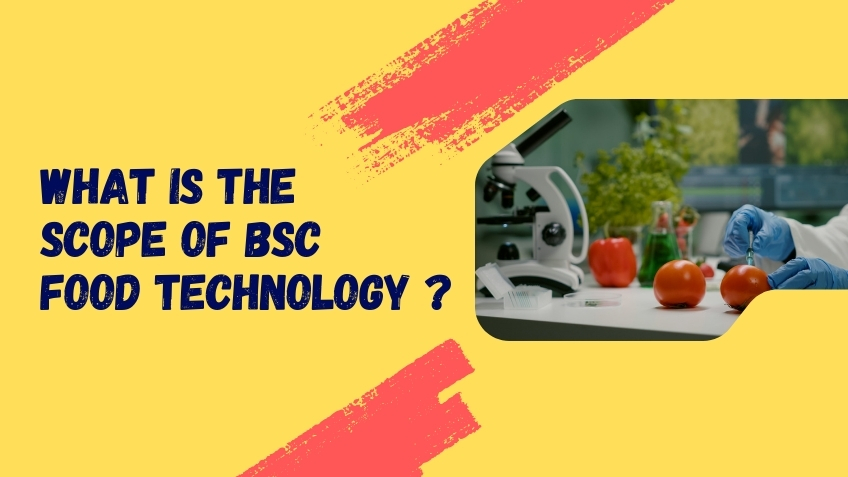
What is the scope of BSC food Technology?
The question shows the broad prospective horizon for graduates in the discipline. What is the scope of BSC food Technology?, we will discuss B.Sc. Food Technology equips students with substantial understanding and skills to overcome quite a few challenges that have emerged over recent years as the food industry continues to develop and expand at an incredible rate due to growing consumers’ needs for nutrition, safety, and sustainability of foods. B.Sc. (Hons.) Food Technology College in Punjab is an undergraduate course that deals with the very essence of the science behind the production, processing, and preservation of food. In modern times, when food safety and quality are being emphasized in the utmost manner, this area has enormous potential opportunities. Students graduating from the course gain knowledge regarding how to make food healthier, ways to keep it fresh for a longer duration, and the development of new food products.
Understanding Food Technology
Food Technology is an interdisciplinary stream that integrates concepts of chemistry and biology with engineering to enable various processes, preservation, packaging, and distribution of food. Since safety and innovation in food are becoming major concerns in this modern world, the talented professionals within the sector have also started to increase exponentially. A B.Sc. in Food Technology has thus been equipped with the very knowledge that can translate into skills in countering such industry demands.
-
Career Opportunities in the Food Industry
The following are some of the key employment areas and roles available after completing the B.Sc. Food Technology:
- Food Processing Industries: The graduates in food technology are dealt with responsibilities related to the development of new food products, improvement of the existing ones, and maintenance of food safety standards. Major recruiters are Nestle, Britannia, ITC, Amul, Hindustan Unilever, and many more.
- Quality Control and Quality Assurance: The aim is quality control and quality assurance. Therefore, graduates become food quality managers, laboratory technicians, and food inspectors to ensure that in all the processes and manufacture of food products, safety hygiene, and good quality control are maintained.
- Research and Development: The companies need experts who are innovative enough in the development of food products and new techniques of food processing to enrich the food products with specific nutrients according to the market demand.
- Government Jobs: The different opportunities are offered by public sector organizations such as the Food Safety and Standards Authority of India or FSSAI. Various other jobs available in the government are that of a food safety officer, agricultural officer, or food inspector.
-
Higher Education and Specialization
Further studies will open better careers and specializations:
- M.Sc. Food Technology: The M.Sc. course would lead further to specialization in food microbiology, food chemistry, and food engineering. This could also lead to a greater scope of research and academia.
- PhD in Food Science: Those who are interested in teaching and research can work on advanced studies and produce scientific knowledge in food technology using a PhD.
- MBA in Food Management: A blend of food technology and business management can offer scope in management, marketing, and business development for the food industry.
-
Government and Public Sector Opportunities
A large number of governmental organizations and public undertakings offer employment to B.Sc. Food Technology graduates:
Food Safety and Standards Authority of India (FSSAI): Food safety officers and regulatory officers in the enforcement of food safety rules.
Departments of Agriculture and Food Processing: Jobs in policy-making, research, and administrative work associated with food processing, processing, and production.
Public Health Organizations: Jobs in public health agencies engaged in food safety and nutrition.
-
Global Trends and Emerging Areas
Drivers of global trends and technological advancements in food technology:
- Sustainable Food Production: More attention is being paid to providing more sustainable approaches for a better today and tomorrow. One such approach has been minimizing food waste, developing methods to use all the resources more efficiently, and eco-friendly packaging materials.
- Food Innovation: The development of novel food products, functional foods, and nutraceuticals is being heralded by the advancement of technology. The trends include plant-based food products, alternative meat without slaughter by use of the lab, and customized nutrition.
- Digitalization: Technology is transforming the food sector through innovations such as automated processing, smart packaging, and data-driven quality control.
Factors to Consider When Choosing a College
-
Curriculum and Specializations
Make sure that the college will align with your career ambitions and passion by following a good curriculum. Look for programs that have specializations in special areas such as food safety, food engineering, or nutrition.
-
Infrastructure and Facilities
Check for the establishment of high-tech laboratories, research facilities, and well-equipped classrooms, all of which would be part of a holistic learning experience. You would also like to go to campus, if possible, to see the infrastructure with your naked eyes.
-
Industry Connections and Placement Opportunities
Colleges that have strong ties with the industry provide better placement and internship opportunities. Identify major food processing companies related to a good institute that offers maximum placement opportunities.
- Faculty Expertise
A good faculty team consisting of experienced and qualified faculty members will add a lot to your learning process. Go ahead and find out their qualification and industry exposure in the food technology department.
- Research Opportunities
Many times, participation in research projects provides excellent experience and insight into concepts in food technology. Opt for a college that also allows students to participate in carrying out research.
Curriculum and Key Subjects
Core Subjects
- Food Chemistry: Understanding What Is in Your Food and How Processing Changed It.
- Food Microbiology: The science associated with the observation of those microorganisms in the food that affect food spoilage and safety. Food processing technology refers to a method and apparatus used to transform raw materials into ready-to-eat food products.
- Food quality control: Techniques and approaches for assuring that a finished food product meets not only legal but also consumer needs.
Nutrition and dietetics are the values of nutrition contained in food that are geared towards health.
Why Punjab is an Ideal Destination for Food Technology Studies
- Agricultural Richness
Punjab is often referred to as the “Granary of India” due to its significant contribution to the country’s agricultural output. The state’s abundant agricultural resources provide an excellent backdrop for studying food technology. Students have access to a variety of raw materials for experimentation and learning.
- Industry Connections
Punjab’s well-established food processing industry offers numerous opportunities for internships and placements. Companies such as Nestlé and Verka have a strong presence in the region, providing students with valuable industry exposure and experience.
- Cultural and Academic Environment
The dynamic culture, along with the scholarly environment in Punjab, makes it very appealing for students. The universities of the state have learning environments that are supportive of students and provide ample extracurricular opportunities to contribute to overall development.
Industry Demand and Career Prospects
Increasing Need for Food Technologists
The demand for food technologists with specific knowledge is increasing day by day. That is attributed to growing food innovation needs and stringent food safety regulations. The food processing industry is one of the largest industries in India, accounting for 32% of the country’s food sector. The same scale of growth in this industry automatically translates into a vast job resource pool for graduates.
Varied Career Options
After graduation, students can enter into a wide range of career options, including:
- Food Technologist: Formulation of new foods along with modification and improvement of existing food products.
- Quality Assurance Manager:
Ensuring food product safety and quality for consumption.
- Production Manager: Manufacturing in a food manufacturing facility.
- Research Scientist: Conducting different research to innovate and improve food products and processes.
- Regulatory Affairs Specialist: To ensure compliance with all relevant food safety laws and regulations.
Conclusion
This program, the B.Sc. in Food Technology, has robust foundational training in the science and practice concerning the production, processing, and safety of food. This is a broad field that opens up very many opportunities for employment in food processing, quality control, research, and entrepreneurship. With increasing concern for food safety, sustainability, and innovation at a global level, graduates from this program can be sure to leave a meaningful contribution to the food industry. Other further studies and specializations can include M.Sc. or Ph.D. in Food Science, among other qualifications like an MBA in Food Management, adding an advantage in career prospects. Government and public sector opportunities also provide stable and rewarding career paths.
Punjab offers a great platform for Food Technology, with a rich agricultural background and a somewhat strong food processing industry. Academic institutions in the state pride themselves on offering comprehensive programs with full modern facilities and stronger industry links.


.gif)


